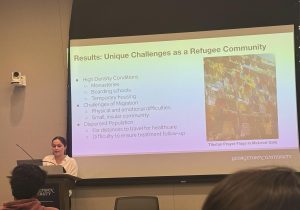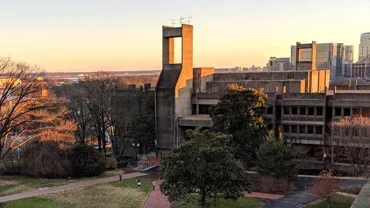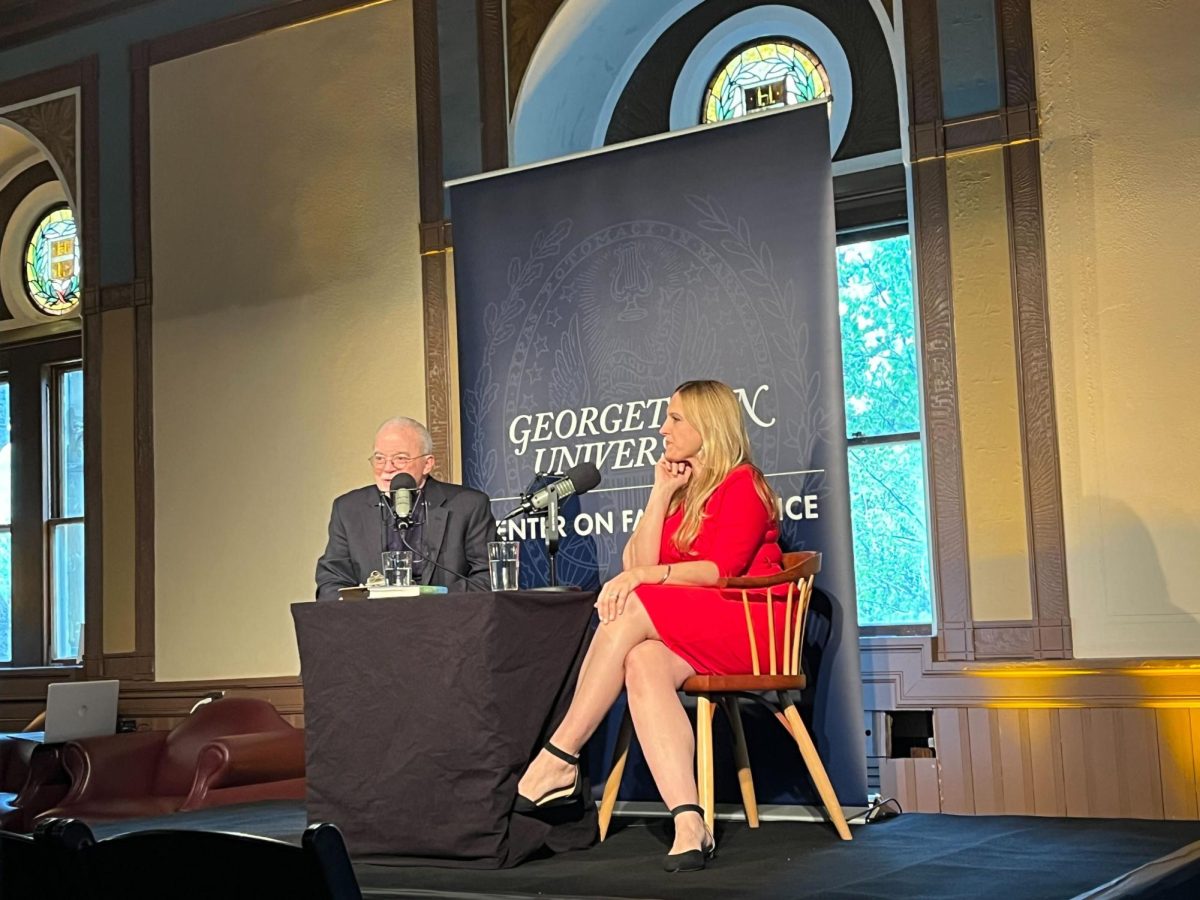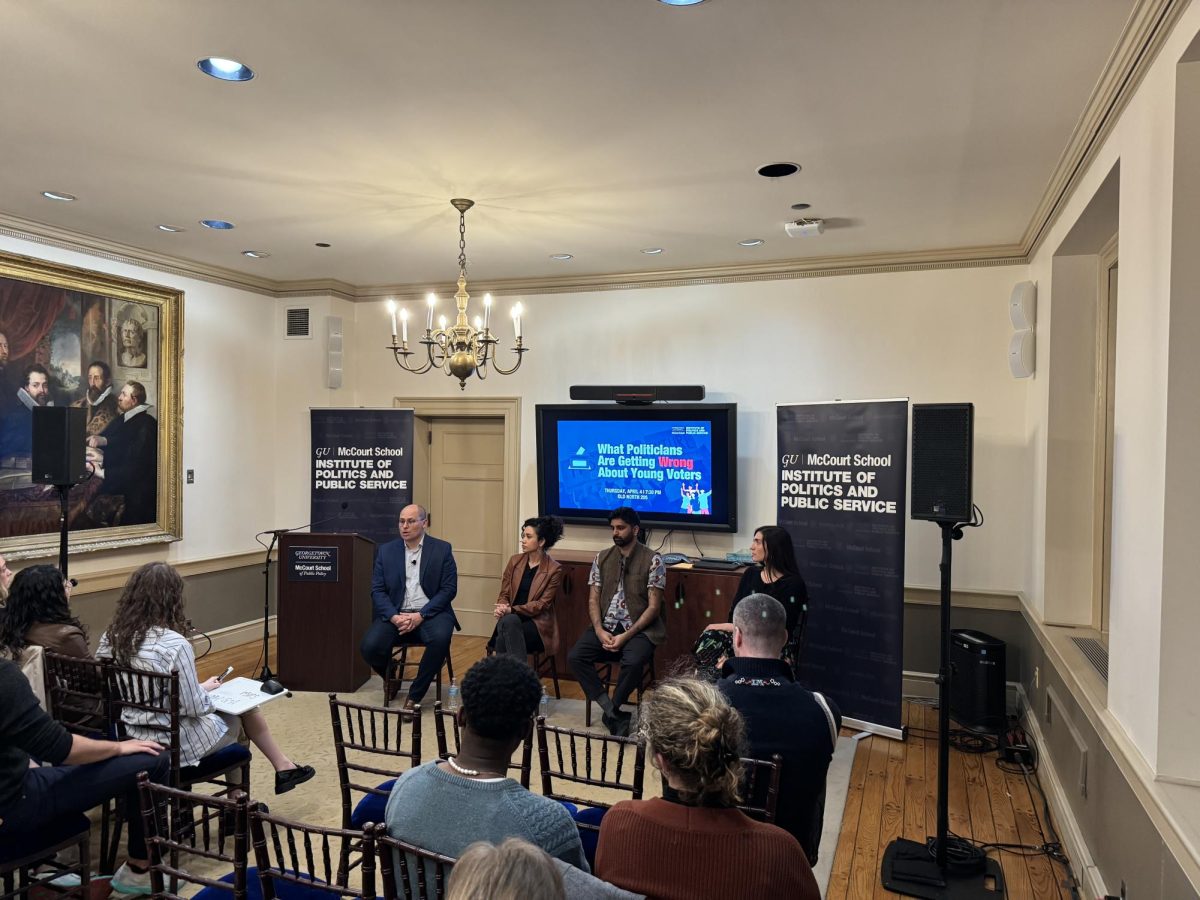A group of 15 Georgetown University undergraduate students participated in an April 23 research colloquium to present their findings on topics ranging from accessible nutrition education to stigma against HIV and tuberculosis patients.
The 2024 Colloquium for Research in the Social Sciences and Humanities, hosted by the College Academic Council, the representative body for the College of Arts and Sciences, enabled student researchers to showcase their work to peers, faculty and community members. Students each had a 15-minute presentation in which they discussed their research and answered questions from the audience.
Stephen Blinder (CAS ’25), a student researcher who examined how current far-right movements to censor school curriculums in the United States compare to historical far-right book bans and book burnings, relied on historical examples in Nazi Germany and fascist Italy to further his claims.
Blinder said that curricular restrictions are harmful to students because they deny them a wide range of perspectives and condone hateful views.
“The thesis in and of itself is that politicized, restrictive curricular standards and book bans mirror the extremist policies of 20th century far-right regimes,” Blinder told The Hoya. “They starve students of perspectives that build resilience to far-right extremism, and they tacitly endorse the harmful views embraced and promulgated by far-right extremists themselves.”

Aiai Price-Smith (CAS ’25) spent two years analyzing the effectiveness of the Health and Nutrition Initiative, a collaboration between the National Children’s Center (NCC) and the Community Health Division in the School of Medicine’s department of family medicine. NCC is a nonprofit that supports people with intellectual and developmental disabilities, and the Community Health Division allows students to educate community members from Wards 7 and 8 in Washington, D.C., about nutrition and health in monthly virtual sessions.
Price-Smith said that her time working with these families and studying the educational methods the program uses has allowed her to broaden her understanding of barriers to nutrition.
“It gives me a different perspective because we’re in Ward 2 in Georgetown, so while there is food insecurity, there is a lot of food security with being on campus and near a number of grocery stores,” Price-Smith told The Hoya. “Whereas in Ward 8, where the National Children’s Center is, they have lower access because there’s only one major grocery store.”
As Price-Smith continues to work with the program, she said her findings are useful in updating and improving the presentations used during the educational sessions to better connect with and educate underprivileged families about nutrition.
“This is a continuous thing because the center still exists,” Price-Smith said. “But we’re continuing to be partners with the families and continuing to do reviews of our current studies and presentations that we’ve done. I’ll be able to use the knowledge about our own accessibility and how to improve on language and clarity within a presentation.”
Blinder added that “The Weaponization of Hate,” a class he took last semester with Jacob Ware, an assistant adjunct professor in the Center for Jewish Civilization, inspired his research.
Ware said Blinder’s research comes at a particularly unique political context in the United States and that such work is vital in revealing the danger of the current political climate.
“We are at a fraught moment in our history and in our political landscape,” Ware told The Hoya. “I think research that is historically informed and data based and sensitive to political developments is super important in helping shed light on some of the things that we are witnessing.”
Student researcher Isabel Powell (CAS ’24) studied abroad in India last spring, where she interviewed HIV and tuberculosis patients, their family members and health care professionals about the stigma and challenges they faced.
Powell said that what was most impactful to her during the research process — which ultimately found that stigma impacted patient engagement with treatment — was the willingness of people to talk about extremely personal and difficult experiences.
“I found that overwhelmingly people were so willing to share this story with me, because they really understood the importance of sharing the narrative and really wanted to share it so that other people don’t have to experience the pain that their family members did,” Powell told The Hoya.
According to Blinder, the colloquium was a special opportunity for undergraduate researchers and encouraged more students to embark on research projects.
“I think it’s just a wonderful spotlight for students at the undergraduate level to have and I hope in the future that more people will pursue undergraduate research,” Blinder said. “There’s no minimum age to being on the right side of history, and I do think that people at the undergraduate level can really contribute to developing scholarship on the most pressing issues we face today.”




















